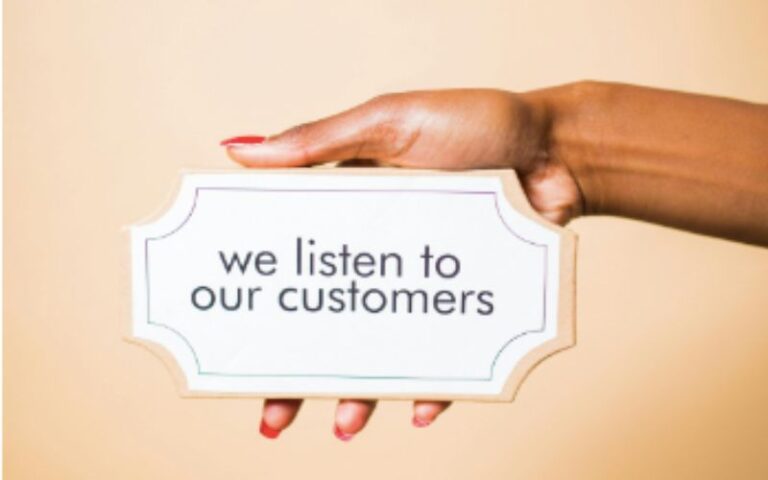Great companies are built not only on providing high-quality products and services but also on excellent customer service.
Yes, product quality matters. But in today’s cutthroat market, customer service is the key to winning people over.
A Microsoft study found that 90% of customers consider customer service when choosing a brand they’ll be loyal to. Customers will stick with a business that supports them well.
Top-notch customer service makes shoppers feel valued, and they’ll keep coming back to support your products and services.
But what exactly is customer service and how does it work? Let’s dive into this post and learn customer service definition and examples.
In this article
1. What is Customer Service? [Customer Service Definition]
When you google “customer service,” here’s what the Cambridge dictionary says:
“The fact of treating customers in a polite and helpful way, which is considered an important part of running a good business”
This is exactly what most people think of first when asked to define customer service. Yet, in today’s context, it can be defined quite broadly.
How exactly does a business politely treat or help customers?
From a business standpoint, customer service is defined as delivering assistance, guidance, and information to customers before, during, and after they acquire your product and services.
When they ask about your products and you promptly answer them, that’s customer service. When you manage their shipping problems, that’s customer service. As long as you take care of your customers, that’s customer service.
On the other hand, customer service for customers serves as their avenue to raise their inquiries and concerns about your products and services.
For instance, QuickCEP is a customer service platform that deploys AI chatbots for business owners as their first-level support in providing instant information, assistance, and guidance to customers. People can “talk” to its chatbot to ask questions about a business, find solutions to their concerns, or elevate their issues to an agent.

2. How Does Customer Service Work?
A business relies on a team of support representatives or agents to get its customer service running. These agents assist customers with complaints, difficulties, confusion, or suggestions during their purchase journey.
Typically, customers get in touch with the business’s help desk first. They will raise their concern through email, SMS, social media, or live chat customer support. Then, the customer service team has to respond swiftly to avoid customer frustration.
Unfortunately, support reps cannot work 24/7. So, to ensure reliable, around-the-clock customer assistance, many companies have also added technologies such as AI chatbots, Interactive Voice Response (IVR), and auto-ticketing system to automate their customer service
Customer service also works even before the customer makes a purchase. Suppose someone visits your site and becomes interested in your products. When this person uses the live chat to ask about the product, the customer service team (and technologies) is working in the background that will respond to the visitor.
Types of Customer Service
Here are some common types of customer support in various industries:
Web live chat support
Email support
Phone/SMS support
Self-service options
In-person support

3. Customer Service Examples
Many of us have already experienced contacting a business’s customer service. Remember that day you requested a product return and refund?
It’s most likely a company rep swiftly answered your call, politely asked your concern, listened to the details, and managed to set up the return and refund. This is a clear example of good customer service. An excellent showcase of promptness, respect, active listening, and problem-solving.
A survey by Forbes found that big brands such as Amazon, Walmart, Best Buy, and Target are perceived with excellent support service by customers. Reasons cited for such positive perception include “friendly and engaging experience” and “well-trained people”, reminding us that good customer service is a mix of customer-centric support and expert-level assistance.
On the other hand, negligence, inaction, and sluggishness create bad customer service.
For instance, a woman once ordered toilet paper from Amazon and had to pay insanely high delivery fees. She reached out to customer support but the team just laughed off her concern and passed her to the third-party seller to fix the problem by herself. In hopes of finding a solution, the lady wrote to the CEO and asked for help from a local TV station. She got the refund two months later.
Common Customer Service Concerns
Many customers raise the following concerns to customer service:
Technical issues
“I’m having trouble turning it on”
“The new feature is not working”
“I keep getting an error message”
Returning a product
“I received a different item/size/color”
“I want to return a damaged item”.
“This one doesn’t fit me, can I return it?”
Asking for a refund
“I was overcharged, I need a refund”.
“I received a defective product, so I ask for a refund!”
“I was billed wrongly, I want my money back”.
Order Status
“When will I receive my order?”.
“Please tell me my order tracking number”.
“What is the delivery status of order no. X?”
Shipping and delivery inquiries
“Can you deliver packages in [city/country]?”
“How much is the shipping fee?”
“What courier services can I use?”
Product availability questions
“Is this product available?”
“Do you have an item for doing X?”
“X is out-of-stock, what is its restocking date?”
Product variety questions
“Do you have a medium or large size for X?”
“What colors are available?”
“How different is X from Y?”
Product recommendations or reservations
“My budget is $100, what should I buy?”
“Which one of these products is best?”
“Kindly reserve this product, I will purchase it next week.”
Operating hours and location
“Are you open during weekends?”
“Are you open until 9 PM?”
“Do you have a physical store in the city?”

4. Why is Customer Service Important?
There’s a reason why customer service is part of every company. Aside from providing support and assistance, customer service is crucial for revenue growth, brand building, and stronger customer loyalty.
Here’s why customer service is essential to your company.
Customer service boosts conversions and increases profits
Serving your customers well entices them to avail of your products and services. A good 56% of customers are willing to pay more for a product of a company with stellar customer service. In short, top-notch customer service can drive revenue growth to your business.
It fosters good relationships with customers, which encourages brand loyalty
Top-notch customer support keeps your customers happy. When you offer prompt and effective assistance, it reflects your business value and cares about your customer needs. This creates a strong rapport between your business and its customers, fostering long-term brand loyalty.
Customer service enhances your brand’s image, builds trust, and creates a good reputation
The more customers you effectively assist and serve, the more your business appears as a trustworthy and credible brand. This makes your business reputable and people will be more inclined to choose your products and services. Around 90% of customers support a business with good customer service.

5. How to Identify Truly Good Customer Service
You must keep an eye on these indicators to ensure good customer service.
Personalized Customer Service
Excellent customer service interacts with customers on a “personal” level. This means that your service is centered on meeting individual needs and interests. For instance, you must attentively listen to their preferences about a product to give them tailored-fit recommendations.
Truly Good Customer Service Needs Empathy
Understand the emotions and thoughts of your customers so they’ll feel that your company is compassionate and supportive of their concerns. It also helps you to properly communicate with them and avoid aggravating their frustrations
Responsiveness is Necessary
Customers hate waiting in line for hours, so your customer service must be responsive and fast. More importantly, your support desk must always be available to ensure that customers can get assistance 24/7.
Product Knowledge
Give accurate and comprehensive answers to product-related customer queries. Skilled agents are good at providing product information, yet they might struggle to retain knowledge if you have a wide range of products. Thus, many companies adopted automated knowledge base technologies to provide information to customers.
Professionalism is Essential
Good customer service uses formal and appropriate language as well as maintains a calm and respectful tone. For instance, when an annoyed customer starts lashing out, the service rep must remain level-headed.

Final Thoughts
From the name itself, customer service is all about serving your customers in hopes of providing them with a better experience interacting with our business.
When we say serving, this includes responding to their questions, attending to their complaints, providing personalized recommendations, and giving order status updates—all of which can be performed by QuickCEP.
QuickCEP creates AI chatbots for your online store to automate customer service tasks such as answering customer queries, tracking order status, facilitating product returns, and more. It also features an AI email writing assistant for drafting compelling email replies to your customers.
Sign up now and start improving your customer service for FREE today.



